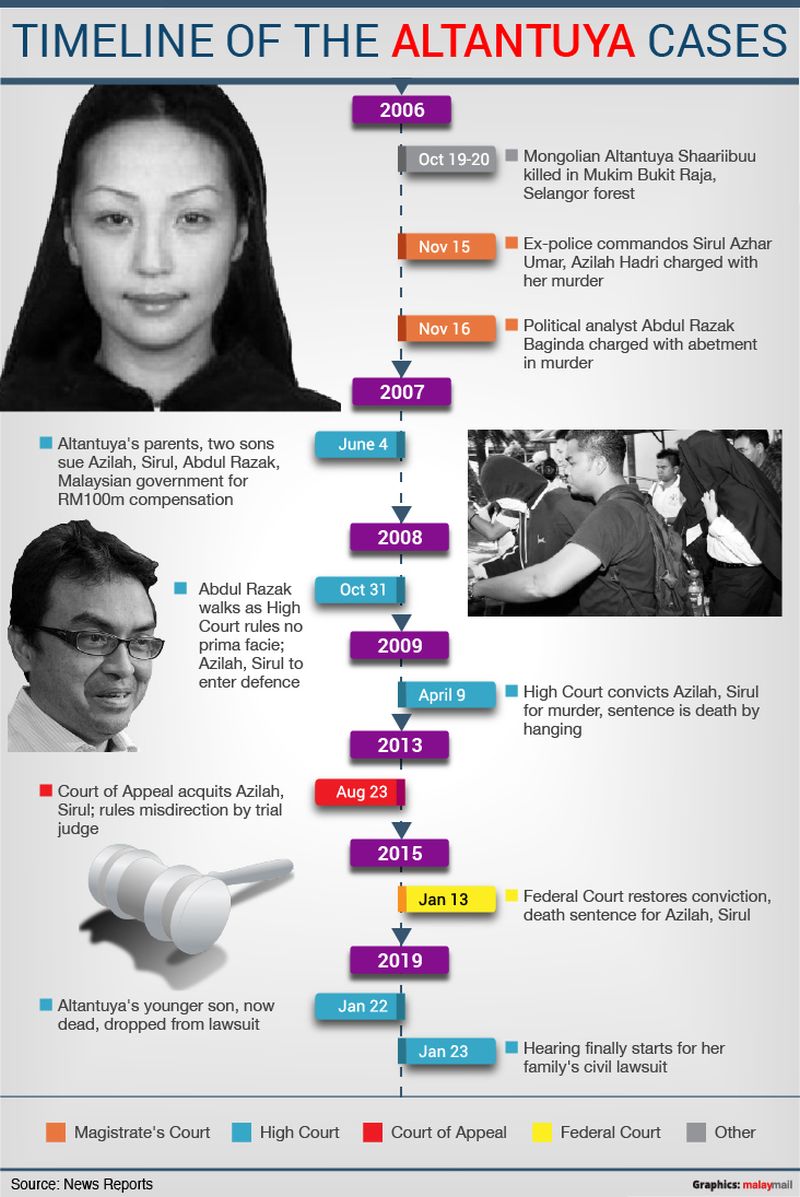PUTRAJAYA, Oct 10 — The father of Mongolian model Altantuya Shaariibuu, who was murdered in 2006, today unexpectedly backed former police commando Azilah Hadri’s application for his death sentence to be reduced to imprisonment and caning.
Azilah’s lawyer J Kuldeep Kumar read out the letter by Altantuya’s father Shaariibuu Setev which backed the application to reduce and replace the death sentence with life imprisonment.
“As far as the impact on the victim’s family is concerned, we have the letter from the victim’s father, he also asks for commutation of the death sentence to life imprisonment,” the lawyer told the Federal Court.
Kuldeep then proceeded to read out the English translation of Altantuya’s father’s letter, where the Mongolian citizen had said he was writing to formally request for Azilah’s death sentence to be commuted to life imprisonment.
The father said he had previously addressed this matter in his letter to Malaysia’s prime minister, without specifying which prime minister he was referring to.
“It is crucial to recognise that the United Nations declares the sanctity of life, emphasising that all beings on this planet have a right to existence. My request stems from a deep respect for the humanity of Mongolians,” the letter addressed to Azilah’s lawyer said.
“Furthermore, I urge a prompt resolution to the civil suits that have been pending for many years,” the father’s letter said.
“Additionally, I ask that you convey the relevance of this request to Sirul Umar, who co-perpetrated the tragic case, as well as to his lawyer, the court, the prosecutor’s office, and the government,” the father said in the letter, also urging for the honouring of the “virtues of humanity” and the upholding of “truthful expression in every nation”.
Lawyer Sangeet Kaur Deo, who was holding a watching brief for Altantuya’s father Shaariibuu Setev in this case, this morning informed the Federal Court that she had the original copy of her client’s letter and verified that she had handed a copy of the letter to Kuldeep.
The Attorney General’s Chambers’ appellate and trial division head Datuk Mohd Dusuki Mokhtar confirmed to the Federal Court that the prosecution was “not objecting” to the letter.
Today is the Federal Court’s hearing of Azilah’s application for a review of his death sentence over Altantuya’s murder, where he was seeking for the Federal Court to reduce or replace his sentence with jail time and caning instead.
The hearing is ongoing.
The Federal Court panel hearing Azilah’s application is chaired by Chief Justice Tun Tengku Maimun Tuan Mat, and is composed of President of the Court of Appeal Datuk Abang Iskandar Abang Hashim and Federal Court judge Datuk Nordin Hassan.
After the prosecution confirmed it was not objecting to Altantuya’s father’s letter, Tengku Maimun said: “There’s no dispute this is written by the victim’s father, so we accept it as it is.”
Later when met outside the courtroom, Altantuya’s father’s lawyer Sangeet said her client had written the letter as he was against the death penalty, and confirmed that the “civil suits” which the father had referred to was the recent one where the courts ordered for Azilah, Sirul Azhar, Abdul Razak and the Malaysian government to jointly pay RM5 million in compensation to Altantuya’s family. That civil suit is currently pending appeal at the Court of Appeal.
Azilah, now 48, has been on the death row in prison for the past nine years, after the Federal Court in 2015 decided to uphold his conviction.
Azilah was aged 30 and the chief inspector with the police’s special action unit (UTK) when he was charged in 2006 with the murder, and was aged 39 when the Federal Court decided that both he and fellow police commando Sirul Azhar Umar are guilty of the crime.
At the time of Azilah’s conviction for murdering Altantuya, the punishment under the Penal Code’s Section 302 was a mandatory death sentence. This means the courts had no discretion to hand down alternative sentences.
After Malaysia changed its laws last year, the courts can now choose to decide whether to sentence a person who committed murder with either the death penalty; or between 30 to 40 years of jail and at least 12 strokes of the cane.
Following the changes to Malaysian law, prisoners in Malaysia who were sentenced to death for murder — including Azilah — had applied to the Federal Court to review their sentences and to consider replacing it with a minimum 30-year imprisonment and caning.

Recommended reading:After nine years on death row limbo, Azilah to know final fate today over Altantuya murder Altantuya was murdered 18 years ago — Here’s what happened since, as Azilah sets to commute death penalty



















